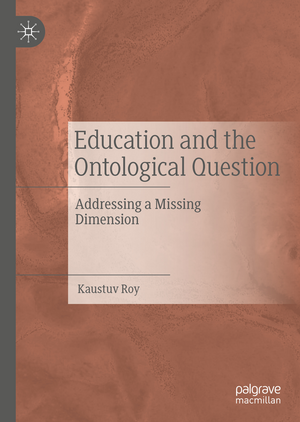Education and the Ontological Question: Addressing a Missing Dimension
Autor Kaustuv Royen Limba Engleză Hardback – 21 ian 2019
This book identifies and expands upon the link between ontology and education, exposing a lack of ontological inquiry as the vital missing element in the study and practice of modern education today. In this book, Roy aims to reintroduce ontological thinking and reasoning that grounds historical and modern educational understandings and practice. Beginning with a historical perspective, he then turns to examine the results of his scholarship into practical concerns of education such as language, dialogue, and curriculum: ultimately proposing a new way forward emphasizing a balance in the education effort between epistemic content and ontological disclosure.
Preț: 448.79 lei
Preț vechi: 487.82 lei
-8% Nou
Puncte Express: 673
Preț estimativ în valută:
85.90€ • 88.52$ • 72.52£
85.90€ • 88.52$ • 72.52£
Carte tipărită la comandă
Livrare economică 26 februarie-04 martie
Preluare comenzi: 021 569.72.76
Specificații
ISBN-13: 9783030111779
ISBN-10: 3030111776
Pagini: 244
Ilustrații: XIII, 232 p.
Dimensiuni: 148 x 210 mm
Greutate: 0.45 kg
Ediția:1st ed. 2019
Editura: Springer International Publishing
Colecția Palgrave Macmillan
Locul publicării:Cham, Switzerland
ISBN-10: 3030111776
Pagini: 244
Ilustrații: XIII, 232 p.
Dimensiuni: 148 x 210 mm
Greutate: 0.45 kg
Ediția:1st ed. 2019
Editura: Springer International Publishing
Colecția Palgrave Macmillan
Locul publicării:Cham, Switzerland
Cuprins
1. Introduction: Education and Ontological Amnesia.- 2. Being in Antiquity.- 3. Being in the Present Age.- 4. Being in Practice.- 5. Language of Being.- 6. Creative Being.- 7. Epilogue.
Notă biografică
Kaustuv Roy is Professor of Philosophy and Sociology at Azim Premji University in Bangalore, India.
Textul de pe ultima copertă
“What Roy has accomplished is a real achievement, a genuine and remarkable scholarly contribution. Ultimately I believe he has fully and completely fulfilled his aim of addressing an immense oversight in educational thinking and scholarship: the ontological question. Not only does he reference educational scholars who are generally not as well known, but Roy also grounds his approach in the thinking of Jung, Levinas, and Merleau-Ponty in an innovative and provocative manner.”
—Matthew J. Kruger-Ross, Assistant Professor of Educational Technology and Philosophy of Education, West Chester University, USA
This book identifies and expands upon the link between ontology and education, exposing a lack of ontological inquiry as the vital missing element in the study and practice of modern education today. In this book, Roy aims to reintroduce ontological thinking and reasoning that grounds historical and modern educational understandings and practice. Beginning with a historical perspective, he then turns to examine the results of his scholarship into practical concerns of education such as language, dialogue, and curriculum: ultimately proposing a new way forward emphasizing a balance in the education effort between epistemic content and ontological disclosure.
—Matthew J. Kruger-Ross, Assistant Professor of Educational Technology and Philosophy of Education, West Chester University, USA
This book identifies and expands upon the link between ontology and education, exposing a lack of ontological inquiry as the vital missing element in the study and practice of modern education today. In this book, Roy aims to reintroduce ontological thinking and reasoning that grounds historical and modern educational understandings and practice. Beginning with a historical perspective, he then turns to examine the results of his scholarship into practical concerns of education such as language, dialogue, and curriculum: ultimately proposing a new way forward emphasizing a balance in the education effort between epistemic content and ontological disclosure.
Caracteristici
Utilizes social phenomenology as the analytical framework for discussion about ontology and education today Includes an in-depth historical overview of four major ontological moments in human history: those of Egypt, India, Greece, and Latin Christendom Rooted in the hermeneutical and phenomenological tradition of Heidegger, Gadamer, Husserl, and Spinoza
